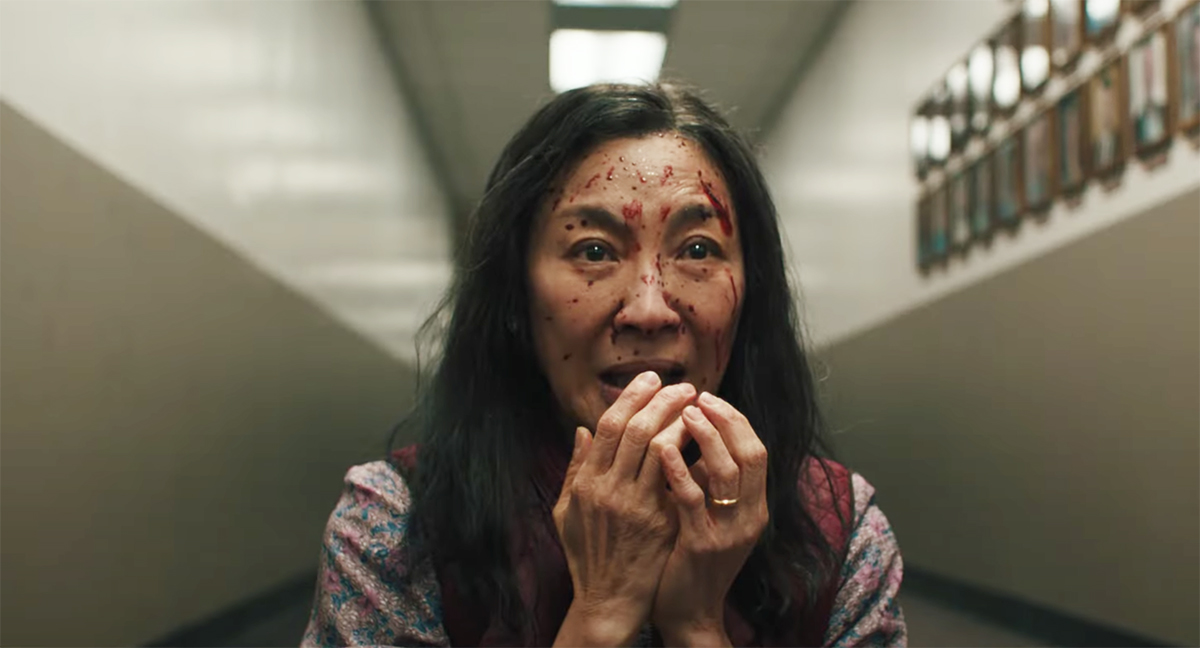How ‘Everything Everywhere All At Once’ Perfectly Captures Our Internet-Addicted Existence
Michelle Yeoh's adventures in the multiverse are an apt metaphor for our collective attention deficit.

In the Daniels’ stunning multiverse masterpiece Everything Everywhere All At Once, Michelle Yeoh’s Evelyn Wang is a woman in constant motion. Evelyn juggles a tax audit, a struggling laundromat, an ailing father, her nebbish husband Waymond (Ke Huy Quan), and her sardonic daughter Joy (Stephanie Hsu). And despite their repeated pleas that Evelyn stop moving and listen to them, she is unable to focus on the people most important to her. There is too much to do, too many things to manage. So when a version of Waymond from the Alpha-verse tries to recruit her to fight a multiversal evil, she immediately rejects it. After all, she has more than enough on her plate without worrying about a universe-destroying Big Bad.
EEAAO is many things: a meditation on nihilism and the meaning of life, a metaphor for intergenerational family trauma, a poignant look at the roads not taken and the lives not lived. The film is so philosophically dense, so thematically rich and expansive that audiences will be unpacking its nuances for years to come. But EEAAO also functions as a mirror to our current internet obsessed, ADHD reality.
While the internet and smart phones have changed the way we live our lives in a myriad of ways, their deleterious effects have savaged our concentration, our patience, and our ability to reflect. Constant informational overload has fundamentally altered our brain’s neuroplasticity. Nicholas Carr unpacks this phenomenon in his book The Shallows: What the Internet Is Doing to Our Brains, where he writes that the “cacophony of stimuli” leads to “cursory reading, hurried and distracted thinking, and superficial learning.” He adds, “If, knowing what we know today about the brain’s plasticity, you were to set out to invent a medium that would rewire our mental circuits as quickly and thoroughly as possible, you would probably end up designing something that looks and works a lot like the internet.”
The Daniels use the metaverse to explore the consequences of this information overload. In an interview with the LA Times, Daniel Kwan says the script was inspired by the “contradictions and emotional whiplash” of being extremely online. “The internet had started to create these alternate universes, … We were for the first time realizing how scary the internet was, moving from this techno optimism to this techno terror. I think this movie was us trying to grapple with that chaos.”
We’re well aware of what this informational overload reaps. People fall down YouTube conspiracy holes and ensconce themselves in echo chambers that reinforce all their beliefs. Conspiracy theories run amok, and agitators will doxx and harass anyone who dares to think differently from them. This tool is supposed to bring the world together, but people find themselves more isolated and more lacking in community than ever. This informational overload, this 50-tabs-open existence serves to flatten and compartmentalize the world in a myriad of damaging ways. It drains us of our empathy, making us colder and crueler.
Bo Burnham addresses this phenomenon in his Netflix special Inside. In his song “Can I Interest You in Everything All of the Time” he sings, “A little bit of everything/All of the time/Apathy’s a tragedy/And boredom is a crime/Anything and everything/All of the time.”
It’s a phenomenon that has only gotten worse since the pandemic began, which saw us all more inside and more online than ever before. Humans were forced to grapple with the existential despair of a global pandemic, while simultaneously expected to go about business as usual (Apple TV+’s Severance is an excellent mediation on this as well). The relentless demands of capitalism forced many to compartmentalize and continue working, despite closed schools, no childcare, and the relentless anxiety and fear of getting sick. It also exposed the systemic issues plaguing our government, our infrastructure, and our healthcare industry. It’s a monumental despair that is crushing if you dwell on it too much. Luckily for us, we still have 49 tabs open to pull focus.
EEAAO sees Evelyn finding her footing amidst countless multiversal identities by slowing down and focusing on what’s really important. In being true to herself and appreciating the family she has, she finds something to hold onto in this noisy and chaotic world. She discovers that even googly eyes can be a grounding force for good. It’s a beautiful reminder that life isn’t defined by accomplishments and accolades. It’s the relationships and love you share that makes a life worth living. EEAAO is a welcome reminder to close the internet, touch some grass, and hold the people you cherish close. Relax baby, it’s just the noise of the multiverse.
(image: A24)
—The Mary Sue has a strict comment policy that forbids, but is not limited to, personal insults toward anyone, hate speech, and trolling.—
Have a tip we should know? tips@themarysue.com